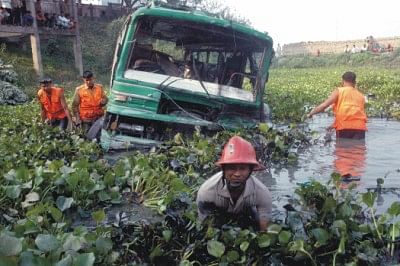Prevention of accident deaths
Jafar Iqbal, On e-mail
Visits to our village home for Eid should be a time of great joy, but unfortunately, year after year, that joy is marred by needless deaths. Recently over the Eid holidays, twenty people died in a road crash in Savar, and road accidents occurred in thirteen districts of the country, causing unlimited sufferings to homecoming people for celebrating Eid and revealing the extremely poor condition of our communication system. Year after year, even day after day, there is a repetition of the same events, news headlines on the tragic deaths of children and adults, causing deep concern and anxiety for all. Those dying on the roads are our brothers, sisters, children, parents, neighbours and friends. Following those deaths, Eid will come not as an overwhelming joy, but as a painful memory of the death of loved ones. This is the tragic truth of our everyday life. Anyone may be victimised at any time. This fear is not groundless.According to government figures, every year in Bangladesh four thousand people die and five thousand are injured in road accidents. But many suspect the actual figures are more than ten thousand deaths and twelve thousand injured. Of patients being admitted to the emergency ward in orthopaedics hospital, 56 percent are due to road crashes. In 2005, 3,437 people died and 15,742 were injured due to road crashes. The social and psychological cost of families losing an income earner or beloved child, or of people losing their legs, never to walk again, cannot be measured with statistics. The government and concerned authorities try to hunt up solutions, from the problem of traffic management, blaming the drivers in the name of reckless driving, removing poorly maintained vehicles from the roads, and suggesting a magnetic train. But we must question how practical and realistic such solutions are, given pressure on bus and truck drivers to speed, difficulty in banning aging vehicles, and the great expense of a magnetic train. Rather than trying to solve our urgent problem with dreams, we must look for a proper solution in our everyday reality, from within our existing communication infrastructure. In this context, we suggest greatly expanding the use of railway. Think of the numbers of holiday travellers who used rail: did a single person die in an accident? If we ensure effective management and logistic support to the railway system, we will get more advantageous and economically viable output than from roads and highways. If we compare the two modes, we can easily realise how important rail is! The most effective and practical way of greatly decreasing road deaths is to shift much of the transport of people and goods from roads to rail. During 2002-2003, 524 trains were derailed, resulting in the deaths of 28 people and injuring 144. In contrast, there were 8,000 road crashes, which killed about 10,000 people and injured 25,000. That is, 174 times more injured and 357 times more deaths from road than rail. In addition to advantages in terms of safety, rail also has other significant benefits. Consider use of fuel: to travel by rail from Chittagong to Dhaka requires 0.95 to 1.06 liter of fuel per person, while travelling the same distance by road requires 6.22 liter, or five times more. For an individual, rail travel is 32% cheaper than road transportation. Railway used to carry more passengers and larger quantities of heavy goods than bus and other modes of road-based transportation. Trains are far less expensive than bus, truck, or car travel, and far superior in terms of safety, the environment, and amount of space needed to move people. So it is high time to think deliberately for initiating, expanding and promoting rail. In this regard, a major obstacle is planning. If we have strong political commitment, and can ensure smooth coordination of the total system, we will be able to ensure great improvements in our rail network. If we wish to reduce the ongoing slaughter on our roads and ensure transportation facilities for the masses, the one and only alternative is through promoting rail. Imagine a future in which people travel home for Eidand any other occasionsconveniently, cheaply, and perhaps most importantly of all, without fear of loss of life or limb.
|

. PHOTO: AFP |